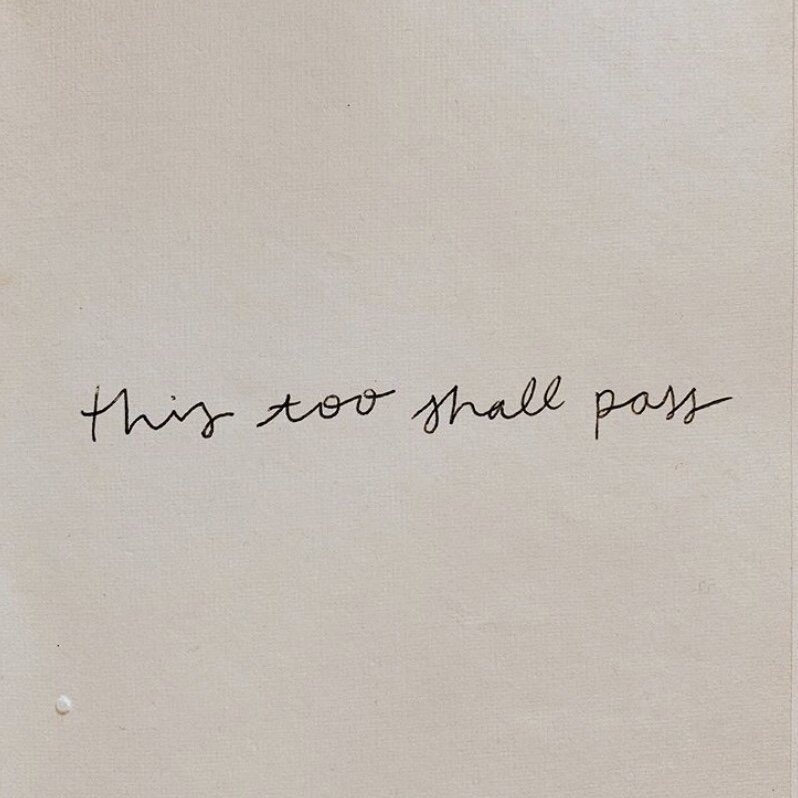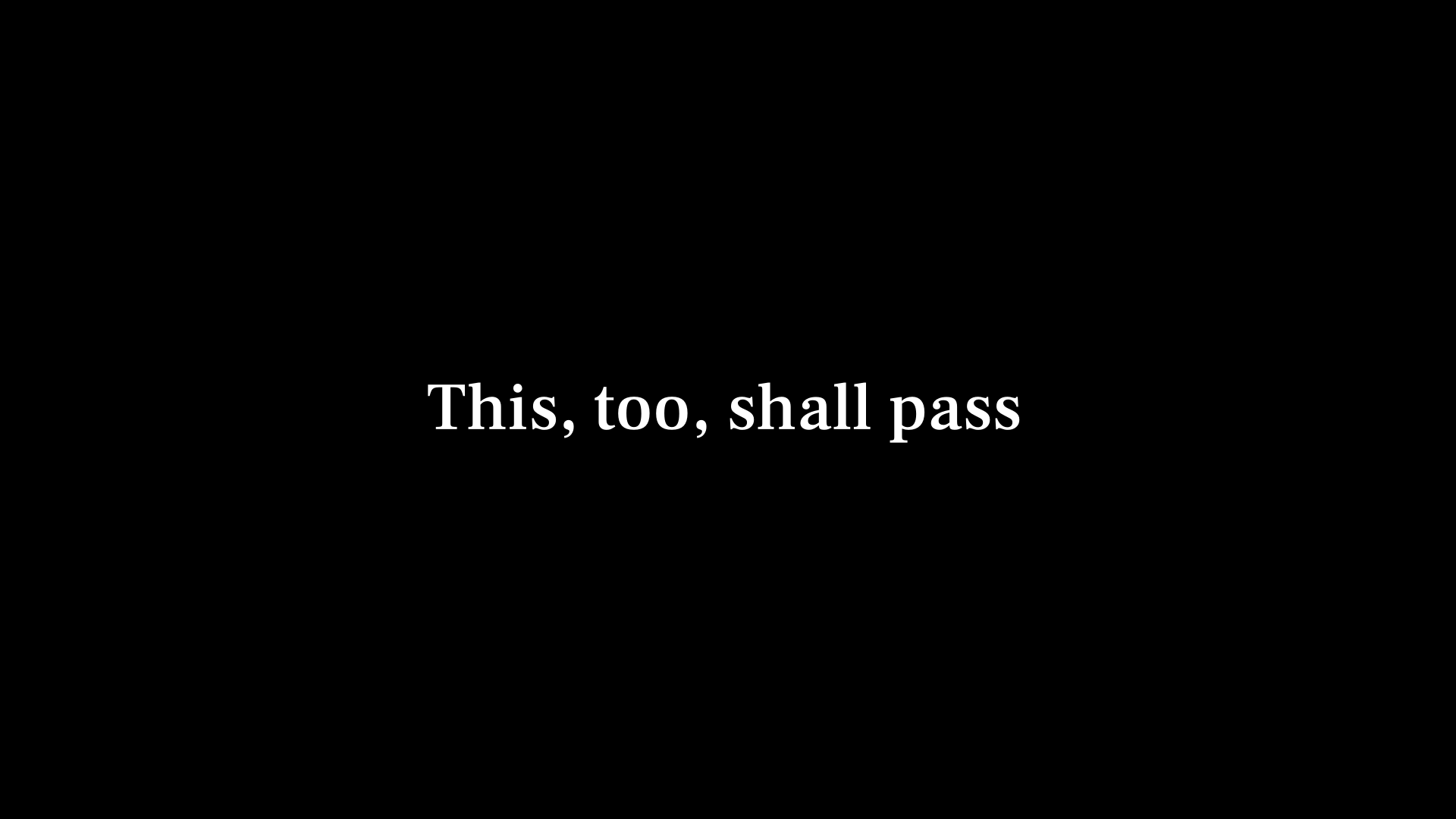“This Too Shall Pass” is one of the most enduring phrases in human history. It encapsulates the universal truth of impermanence that no moment, emotion, or situation lasts forever. This expression appears in Persian poetry, Jewish folklore, and modern leadership philosophy. Its resonance lies in its simplicity: everything changes.
Across centuries, it has comforted kings and peasants alike. It reminds humanity that both triumph and tragedy fade with time. Understanding this phrase in depth requires exploring its origin, meaning, symbolism, and modern applications.

Section 1: Meaning of “This Too Shall Pass”
What Does “This Too Shall Pass” Mean?
The phrase “This Too Shall Pass” means that every event, emotion, or experience whether joyful or painful is temporary. It is both a warning and a comfort. In sorrow, it offers hope; in success, it offers humility.
-
Philosophically, it mirrors the law of impermanence that governs existence.
-
Psychologically, it is a cognitive anchor used to maintain balance.
-
Spiritually, it connects to the concept that worldly experiences are fleeting illusions.
Why the Phrase Holds Universal Appeal
The expression transcends religion, culture, and time because it speaks to the human condition. People suffer and celebrate, yet both experiences fade. “This Too Shall Pass” is the verbal embodiment of resilience and detachment.
It teaches emotional equilibrium — neither excessive despair nor excessive pride. This equilibrium is the foundation of mindfulness and ancient wisdom traditions.
Section 2: Historical Origins and Cross-Cultural Roots
Persian and Sufi Origins
The phrase is widely believed to have originated from Persian Sufi literature. Poets like Sanāʾī, Attar of Nishapur, and Rumi explored the transient nature of the material world. One Persian legend tells of a powerful monarch who asked his sages for a sentence that would hold true in both happiness and sorrow. They engraved a ring with the words: “This Too Shall Pass.”
Whenever the king faced triumph, he read the ring and grew humble. When grief overwhelmed him, he found solace in the same words.
In Sufism, impermanence (called fanaʾ) represents the dissolution of ego and attachment — a path to divine truth. “This Too Shall Pass” symbolizes this spiritual truth in simple language.
Jewish Tradition: The Phrase “Gam Zeh Ya’avor”
In Jewish folklore, King Solomon requested a statement that would humble him in joy and strengthen him in hardship. His wise men returned with the Hebrew phrase “Gam Zeh Ya’avor” — meaning “This Too Shall Pass.”
The story has been preserved in oral tradition and appears in collections of Jewish proverbs and midrashic tales. The ring metaphor also present in the Persian story demonstrates cultural overlap between the Middle East’s spiritual traditions.
Abraham Lincoln’s Famous Use
The phrase gained modern fame through Abraham Lincoln’s 1859 speech to the Wisconsin State Agricultural Society. Lincoln said:
“It is said an Eastern monarch once charged his wise men to invent a sentence… They presented him the words: ‘And this, too, shall pass away.’ How much it expresses! How chastening in the hour of pride, how consoling in the depths of affliction.”
Lincoln used the phrase as a reminder that both national struggles and personal pain are temporary. His adaptation introduced the proverb to English-speaking audiences and embedded it into American moral consciousness.
Section 3: Linguistic Evolution and Misconceptions
Common Misattribution to the Bible
Many people assume that “This Too Shall Pass” comes from the Bible. However, it does not appear in any biblical text. The misconception arises because the phrase echoes Ecclesiastes 3:1 — “To everything there is a season.”
Christian writers often relate the phrase to biblical principles of endurance, such as 2 Corinthians 4:17-18, which discusses the temporary nature of suffering.
| Phrase | Scriptural Relation | Actual Source |
|---|---|---|
| This Too Shall Pass | Not found in the Bible | Persian & Jewish folklore |
| To everything there is a season | Ecclesiastes 3:1 | Hebrew Bible |
| Gam Zeh Ya’avor | Hebrew version meaning “This too shall pass” | Jewish folktale tradition |
The table clarifies that the phrase is extra-biblical yet spiritually aligned with biblical ideas of transience and divine timing.
Section 4: Philosophical Interpretations
Stoic Philosophy
Stoicism, the philosophy of emotional regulation, aligns perfectly with the message of “This Too Shall Pass.” Stoic thinkers like Marcus Aurelius and Epictetus taught that events are neutral; only perception gives them weight. Recognizing that all things change prevents emotional overreaction.
A Stoic mindset interprets “This Too Shall Pass” as an instruction to observe without attachment. It builds mental resilience and inner peace through acceptance.
Buddhist Parallels
In Buddhism, the doctrine of Anicca (impermanence) mirrors the proverb’s essence. The Buddha taught that everything arises and passes away. Attachment to impermanent things causes suffering.
“This Too Shall Pass” can thus be seen as a secular articulation of Buddhist truth — reminding one to let go of craving and aversion alike.
Modern Psychology and Mindfulness
Psychologists use similar principles in Cognitive Behavioral Therapy (CBT) and Mindfulness-Based Stress Reduction (MBSR). Both techniques teach that emotions and thoughts are temporary mental states.
Repeating “This Too Shall Pass” during anxiety episodes helps reframe intrusive thoughts. It acts as a cognitive interrupt reducing catastrophizing and encouraging patience.
Section 5: Applications in Daily Life
1. Emotional Regulation
Individuals struggling with anxiety, grief, or anger can use the phrase as an internal grounding tool. Saying it softly interrupts spiraling thoughts. It reminds the mind that pain is temporary.
2. Leadership and Crisis Management
In leadership, decision-makers often face rapid changes. “This Too Shall Pass” serves as a reminder that both profit booms and crises fade. It encourages long-term vision over emotional reaction. Many CEOs and political leaders use this mindset to maintain composure during volatility.
3. Personal Relationships
In relationships, emotional highs and lows can distort perspective. Remembering impermanence helps partners manage conflict more rationally. It reduces impulsive decisions made under emotional stress.
4. Health and Recovery
Patients and healthcare workers frequently use the phrase during illness and rehabilitation. It encapsulates hope and patience, both vital for healing journeys.
Section 6: Modern Cultural References
In Music and Art
-
OK Go’s song “This Too Shall Pass” (2010) transformed the proverb into a pop anthem about perseverance.
-
Indie artists and writers frequently use the phrase as a tattoo, mantra, or lyric symbolizing rebirth.
-
Visual artists incorporate it into calligraphy, photography, and mixed-media art representing transformation.
In Literature and Cinema
Modern literature and film use the phrase to symbolize the arc of character development. It appears in dialogues conveying wisdom passed between generations. Writers use it as shorthand for resilience and impermanence.
Section 7: Deeper Symbolism
Symbol of the Ring
Both the Persian and Jewish stories feature a ring inscribed with the phrase. The ring itself symbolizes continuity, cycles, and time. The circular shape mirrors the natural pattern of beginnings and endings — reinforcing the lesson of impermanence.
Dual Function: Comfort and Humility
The phrase has dual polarity:
-
It comforts in pain.
-
It humbles in pride.
This symmetry gives it universal applicability. Whether in grief or triumph, it restores equilibrium.
Temporal Neutrality
“This Too Shall Pass” neutralizes emotional extremes by framing experiences within time’s constant motion. It invites neither denial nor indulgence — only observation.
Section 8: How to Practice the Philosophy
Daily Ways to Apply “This Too Shall Pass”
-
Pause before reacting. Breathe and repeat the phrase silently.
-
Journal daily reflections. Write what feels overwhelming and note that it will pass.
-
Set time-based perspective. Ask: will this matter in a year?
-
Visualize flow. Picture emotions as waves moving past you.
-
Use the phrase in gratitude. During joy, remember its fragility to deepen appreciation.
Leadership Practices Based on the Phrase
-
Stabilize teams during crisis remind them that downturns end.
-
Avoid overconfidence during rapid growth periods.
-
Maintain ethical decisions independent of profit swings.
-
Communicate calmness to inspire trust under uncertainty.
-
Celebrate progress moderately every success evolves into a new challenge.
Section 9: Wisdom Across Traditions
| Tradition | Parallel Concept | Phrase / Example |
|---|---|---|
| Buddhism | Impermanence (Anicca) | “All things are transient.” |
| Hinduism | Maya (illusion of permanence) | “The world changes like clouds.” |
| Stoicism | Emotional discipline | “Nothing endures but change.” |
| Christianity | Seasons of life | “To everything there is a season.” |
| Islam | Inna lillahi wa inna ilayhi raji’un (To God we return) | Acceptance of divine will |
These parallels show that impermanence is a global truth recognized by all major wisdom systems.
Section 10: Real World Examples
-
Economic Crises: During the 2008 financial crash, global leaders invoked similar mantras to maintain confidence.
-
Pandemics: Medical professionals often used “This Too Shall Pass” as a symbol of collective endurance.
-
Personal Growth: In recovery groups and therapy sessions, it reminds individuals that healing occurs gradually.
-
Sports Psychology: Athletes repeat it to handle defeat and success with equal composure.
Section 11: Ethical and Existential Lessons
“This Too Shall Pass” is not passive resignation. It encourages responsible action without emotional chaos. Recognizing impermanence leads to ethical balance acting fully in the present while knowing outcomes evolve.
It teaches gratitude in joy, patience in hardship, and humility in achievement. In existential terms, it reconciles humans with time’s flow the same force that destroys also heals.
Section 12: Symbolic Associations
| Symbol / Context | Meaning | Associated Value |
|---|---|---|
| Ring | Continuity, time | Balance |
| Water / Flow | Change | Adaptability |
| Sunset / Sunrise | Transition | Renewal |
| Breath | Present awareness | Mindfulness |
| Stone inscription | Enduring wisdom | Permanence within impermanence |
Each symbol illustrates how physical metaphors embody the essence of the phrase.
Section 13: Psychological Benefits
-
Reduces anxiety: Creates emotional distance from distress.
-
Improves patience: Reinforces long-term thinking.
-
Enhances resilience: Encourages acceptance rather than resistance.
-
Balances emotions: Prevents over-identification with temporary moods.
-
Promotes perspective: Highlights time’s healing capacity.
Clinical psychologists often recommend such grounding mantras to stabilize thought loops.
Section 14: Common Misinterpretations
-
It does not mean apathy or indifference.
-
It does not minimize pain — it contextualizes it.
-
It does not deny success — it tempers ego.
Misuse occurs when people apply it as a dismissal (“You’ll get over it”) instead of a compassionate reminder (“This phase will change”).
Section 15: Integrating It into Modern Mindset
A professional, student, or parent can integrate the principle by viewing change as neutral. Whether it is market volatility, academic stress, or personal loss, perspective replaces panic.
Time remains the ultimate equalizer. Understanding impermanence empowers planning and emotional maturity.
Section 16: Conclusion
“This Too Shall Pass” stands as one of humanity’s most profound phrases. From ancient Persian mystics to modern psychologists, it continues to bridge emotion, faith, and reason. Its simplicity hides vast depth. Every joy and sorrow, victory and defeat, sunrise and sunset prove its truth. Life moves in cycles. To accept this is to live wisely. When people grasp this, they gain not detachment but clarity the clarity that every moment, good or bad, is part of a larger continuum that always flows forward.
Frequently Asked Questions (FAQs)
1. Who first said “This Too Shall Pass”?
Historical evidence points to Persian Sufi poets, later echoed in Jewish folklore and popularized in the West by Edward FitzGerald and Abraham Lincoln.
2. Is “This Too Shall Pass” in the Bible?
No. The phrase is extra-biblical but aligns with biblical themes of change and divine timing, notably Ecclesiastes 3:1.
3. What does “This Too Shall Pass” teach us?
It teaches impermanence, emotional regulation, humility, and hope. It helps individuals endure challenges and moderate pride during success.
4. How can I use this phrase in daily life?
Repeat it during stress, journal it as a reminder, or visualize it engraved on a ring when facing uncertainty.
5. What is the Hebrew version of “This Too Shall Pass”?
“Gam Zeh Ya’avor” (גַּם זֶה יַעֲבֹר) carries the identical meaning and is central to Jewish folklore about King Solomon.
6. Is the phrase relevant in business or leadership?
Yes. It’s used as a principle of strategic patience — recognizing that markets, trends, and crises are cyclical.
7. Why does the phrase comfort people during loss?
Because it gives temporal perspective. It reminds that grief lessens over time and that pain is not infinite.
8. What psychological principle aligns with it?
The phrase mirrors cognitive reframing and mindfulness — both tools for emotional balance and resilience.
9. Are there similar sayings in other cultures?
Yes. “All things must pass” (English), “Everything flows” (Greek Panta Rhei), and “Anicca” (Buddhist) all express the same truth.
10. What is the ultimate lesson of “This Too Shall Pass”?
Everything in life — joy, sorrow, success, or failure — is temporary. Awareness of this truth leads to wisdom, peace, and gratitude.
Learn More: 10 Hidden Meanings Behind the Safety Pin Necklace
Hotels with Jacuzzi in Room in: Ultimate 2025 Guide for Luxury, Comfort & Romance

